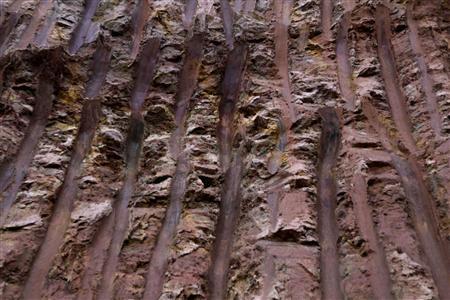Analysis: Rare Earths Next Big Thing Or Will The Bubble Burst?
Date: 28-Oct-10
Country: AUSTRALIA
Author: James Regan

Marks made by an excavator is pictured at the old site of a rare
earth metals mine on the outskirts of Longnan county, in Jiangxi
Province, October 27, 2010.
Photo: REUTERS/Jason Lee
China's increasing reluctance to supply the rest of the world with rare earths is whipping up a gold rush-like frenzy to find new producers of the elements needed to manufacture everything from high-tech weapons to mobile phones.
Producers and would-be producers are forging new supply pacts with consumers, and investors are scooping up shares in mining companies promising to replace the lost Chinese material.
But the ultra-quick global push to find alternative supplies also has investors asking if a classic commodities bubble is in the making.
The world's biggest money manager, BlackRock Inc, thinks it's possible.
"The ability to bring on production quickly in the higher-price environment means that the longer-term sustainability of those prices are questionable," Catherine Raw, a fund manager in BlackRock's natural-resources division, said on Wednesday.
"We are trying to invest on a three to five-year view, and longer, to identify where you can see long-term structural increases in commodities," Raw said.
"The jury on rare earths is still out."
PRICES UP
The price hikes in rare earths has been meteoric: Cerium, widely used in glass-making is up nearly tenfold since 2009. Prices of neodymium and terbium, needed to make magnets, are up more than 40 percent.
This has propelled shares of Lynas Corp and Molycorp Inc., the biggest non-Chinese rare earth firms, to more than double since July, when China announced it was reducing exports by 72 percent in the second half.
Stock in Arafura Resources Ltd, another promising producer, has more than tripled in just a few months.
Beijing says it simply needs to conserve its mine reserves of rare earths for future domestic consumption or it will run out.
Others say it is using rare earths as a trade axe.
China, which produces 97 percent of the world's rare earths, last month halted shipments to Japan after a long-simmering territorial dispute with Tokyo flared.
"Strategic concerns overall toward China are shaping or increasing the level of worry over these export quotas," said Malcolm Cook, East Asia programme director for the Lowy Institute for International Policy in Sydney.
The European Union and the United States on Tuesday said they were pressing for solutions to concerns China may be exploiting its stranglehold on rare earth metals.
Regardless of China's motives, its future commitment to exporting rare earth products remains questionable, leaving the rest of the world looking for 40,000-50,000 tonnes of material a year at today's consumption rate.
"The basic issue is that China needs to use the rare earths for domestic demand first and the left over amount can go to other countries," said Amy Lee, an analyst at Nomura in Hong Kong.
"They are concerned about the limited rare earths in China, so they need to control it."
There are at least two mines outside of China nearing the production stage and poised to address much of the shortfall: Molycorp's Mountain Pass in California and Lynas' Mt Weld in Australia, which together will have the capacity to meet at least two-thirds of non-China world demand within three years.
Potentially another 115,000 tonnes coming from Canada to Australia to Greenland is in various stages of pre-development. And as more uranium mines are dug worldwide, consumers can expect additional supplies as by-products, particularly in Australia and Kazakhstan.
"I think the supply response is well under way," said Andrew Driscoll, head of resources research at CLSA. On top of that, Driscoll believes there are three to four consumers in Japan investing in as many as six projects outside of China to become self-sufficient in the future.
Japanese Prime Minister Naoto Kan this month agreed with Mongolian Prime Minister Sukhbaatar Batbold to cooperate in promoting rare earth mines in Mongolia, according to Kydo.
In Canada, Great Western Minerals Group Ltd. on Wednesday said it had ordered a new furnace needed to process more rare earths, increasing capacity by 50 percent starting in the third quarter of next year.
More untapped supplies ready for plucking are known to exist in Vietnam.
Jonathan Barratt, managing director of Commodity Broking Services in Sydney, said U.S. policy will determine whether the bubble bursts in rare earths.
The Pentagon is due to report on its plans for securing rare earths to U.S. Congress this month.
"Is this a bubble? It depends on what the United States decides to do," said Barratt.
"They have the metal in the ground and if they decide they can cope with the environmental impact and start digging it up, you will see prices adjust quite rapidly."
(Editing by Michael Urquhart)